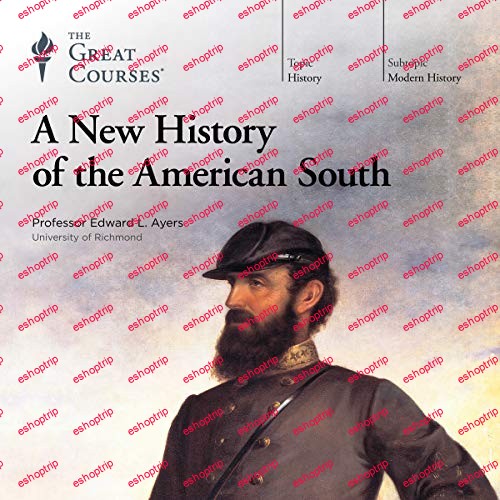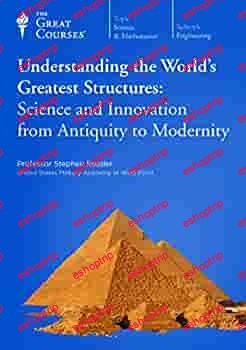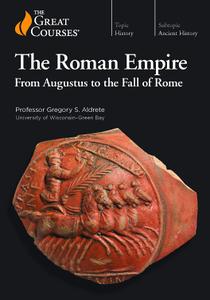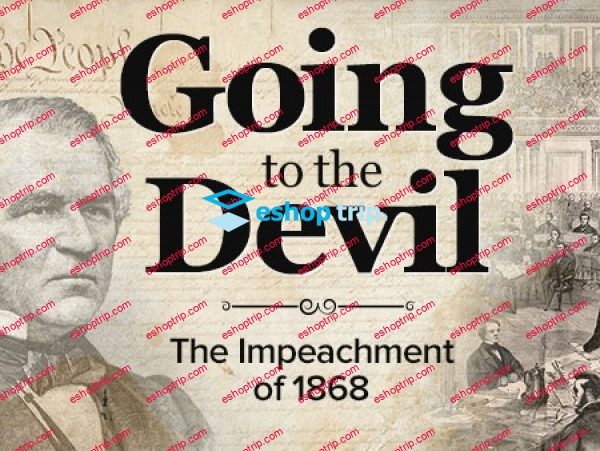TTC Video A New History of the American South
8.08 GB
The American South holds a special place in the minds of people around the world. The South’s extraordinarily colorful and dramatic history, its competing narratives of prosperity and cruelty, its role in the American Civil War, and its influence on the emerging conception of human rights are, for many, the stuff of legend.
Yet, misconceptions and incomplete information abound about the South, concerning not only its origins and development, but also its interconnections with the Northern states, its place in the larger scope of world history, and its repercussions for our own era.
To know the history of the American South, within its own context, is to come to terms with one of modern history’s most astonishing, polarizing, and illuminating stories:
- Within just a few decades after the American Revolution, the South grew into a major force in the world economy, as the largest and most powerful slave-based society of the modern world;
- The political, philosophical, and moral conflicts that surrounded the South’s vast prosperity triggered a war of global consequence;
- The South’s tumultuous remaking following the Civil War witnessed both the boldest experiment in expanding democracy and the largest political revolt in American history; and
- The Southern experience of defeat and regeneration resulted in a globe-spanning legacy of cultural, religious, and artistic expression.
In the 24 lectures of A New History of the American South, taught by an award-winning professor, Edward L. Ayers of the University of Richmond, you’ll delve into these remarkable stories, and many more, exploring in detail the rise and the fall of the slave South, and examining the full scope of a historical epoch that still profoundly influences life in the United States today.
Rediscover the American South
In these eye-opening lectures, you’ll track the historical forces that created the Southern U.S. colonies, how the colonies’ political and economic structures became conducive to the importation of slavery, and how, within the new American nation, the South became one of the most powerful exponents of the Atlantic slave trade.
You’ll trace the growth and evolution of the South, as its archaic system of slavery fused with the trappings of modernity to create a society that was one of the most prosperous and politically democratic in the world—for some—yet home to one of the cruelest forms of oppression for others.
In the flush of its prosperity, you’ll witness the South gamble everything on a bid to create its own nation, leading to devastating war, and the profound changes of emancipation and Reconstruction, events that transformed the South in ways that could never have been foreseen.
And, you’ll study the new society that rose from the ashes of the slave South, a society fraught with violent divisions over what the New South would be, and presenting new and crippling challenges to emancipated African Americans, as well as giving birth to some of America’s most enduring contributions to world culture, such as jazz, blues, country, and gospel music; Pentecostal religion; and the writings of Mark Twain and W.E.B. DuBois.
Enjoy Teaching of Rare Understanding and Insight
A distinguished scholar of the American South and of 19th-century American history, Professor Ayers is unusually well qualified to tell this story. A native of the South who has resided and studied in the North, Professor Ayers distills the narrative with nuanced insight into the ethos and the actions of both.
As an ongoing thread of the course, Professor Ayers uncovers the mindset of the advocates of slavery and segregation, and how the practices were rationalized and justified in terms encompassing the economic, theological, secular, political, and cultural. Along the way, his commentary highlights the factors of anti-slavery and anti-secession sentiment in the South, as well as the varieties of complicity in slavery in the North. The result is a revelatory look at Southern history, and at the critical events and historical currents that made the South what it is today.
Travel Deeply into a Seminal Era
In assessing the story of the South, you’ll focus on the period from the founding of the Southern colonies to the beginning of the 20th century, highlighting essential topics such as:
- The Atlantic Slave Trade: Discover how the Atlantic slave trade, initiated by the Portuguese with the sanction of the Pope, was facilitated by African social systems in which both goods and human beings were items of exchange; learn about the mechanics of the slave trade, and how unimaginable wealth was created in the slave economies of the Caribbean;
- The Forging of the Slave South: Follow the settling of the Southern colonies, and the economic conditions within Virginia, the Carolinas, and Georgia that made slavery a profitable business model; see how the slave economy expanded following the American Revolution, and how wars against both Native Americans and escaped slaves created solidarity among white Southerners;
- Southern Prosperity and Culture: Witness the creation of the large-scale cotton economy that emblemized the South, and the remarkable wealth and lifestyles of plantation owners; learn how the enslaved lived and worked, the diversity of slaves’ occupations on plantations and within cities, and the ways in which slaves rebelled against a dehumanizing system;
- Breakdown of the Union: Examine the events that marked the disintegrating relations between North and South, from the emancipation of the Northern states and the rise of antislavery and abolition movements to the heated struggles over slavery within Missouri, Kansas, and former Mexican lands, and the divisive presidential election of 1860;
- Emancipation and the Experiment of Reconstruction: Learn how African Americans responded to emancipation in their quest for fundamental rights; relive the era of Reconstruction, and the bitter conflict between the North’s efforts to remake the South and white Southerners’ actions to reassert the power they held before the war; and
- Segregation and the New South: Observe how political and legal means were employed across the postwar South to separate the races and maintain white supremacy; study the variety of social restrictions and violence that characterized African American life following Reconstruction; and learn how modern agriculture and industry transformed life in the New South.
Gain a Discerning Perspective on History
Professor Ayers brings to these lectures the same compelling style as a speaker that has made him a nationally recognized co-host of the history podcast BackStory. Throughout the course, he adds layers of revealing context and detail that aid in comprehending the extraordinary saga of the South.
In tracing the complexities of North/South relations, he reveals that Thomas Jefferson’s first draft of the Declaration of Independence vigorously denounced slavery, and that the Congress of the new nation both gave substantial concessions to slaveholders and worked to limit slavery’s geographical scope.
As the course progresses, you’ll explore the vital role of religious faith in Southern culture, learning how evangelical Christianity offered disparate benefits for black and white Southerners, and later became a major social force within the New South. And, within the landscape of the New South, you’ll follow the process by which Southern musical culture, encompassing genres such as blues, jazz, gospel, and country music, became a globally impactful form of expression.
In A New History of the American South, you’ll take a richly detailed excursion into the story and the enduring legacy of the South, in a historical inquiry unique in its scope. No book and no other course brings together the development of the slave South, the wartime South, the reconstructed South, and the New South as Professor Ayers does in these enthralling and incisive lectures. In Professor Ayers’s words, “We cannot understand the United States if we do not understand the South, which has played such an outsized role in the history of our country.”











Reviews
There are no reviews yet.